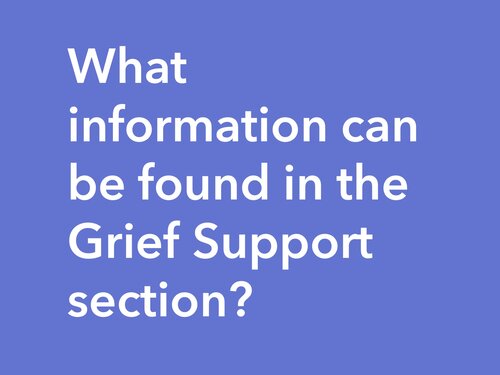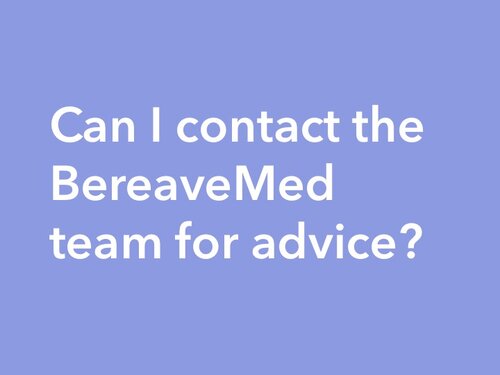BereaveMed is designed to be a resource for medical students who are coping with grief. We believe that due to the demanding training process for physicians, medical students face a series of unique personal, professional, and academic challenges in working through issues of bereavement. That being said, many of the resources, expert blog posts, and first-hand stories that are shared here on our website may still be helpful for grieving individuals in other fields. We hope that even if you are not a medical student, you can still find something useful or supportive here on our site.
There are many experts who have spoken on the subjects of grief and loss in medicine, but we know how challenging and time-consuming it can be to seek out their voices, particularly for a student already juggling the intense academic and professional responsibilities of medical school. The Grief Support section of our website includes a compilation of books, journal articles, podcasts, films, and links to other online communities that may be helpful if you’re looking for extra insight into the grieving process. These resources cover a whole host of topics, from dealing with various kinds of death to building resilience to coping with grief in the medical field.
We are always looking for Storytellers to share their valuable perspective with the community and we’d love to hear from you! You can submit a story request here. The BereaveMed team will contact you with our story guidelines and clarify whether you would like your story to be published anonymously.
We value each and every one of the experts who volunteers to write a blog post for BereaveMed and we appreciate your interest! Please contact us with your name, credentials, and the topic you wish to write about, and our team will reach out to you regarding the process of publishing your post.
We welcome your ideas on how we can improve or expand our services. Please contact our team with your suggestions. We look forward to hearing from you!
We do not capture or store any personal identifying information, unless it is provided directly through the contact form. This information is used for the sole purpose of communication between the user and the BereaveMed team. It is not shared with third parties. We do capture non-personal identifying information, such as website use data, as it helps us understand how resources are being used and how we can improve the website. This information is also not shared with third parties. For more on this, you can view our Privacy Policy.
Thank you so much for your interest in supporting BereaveMed! Your financial contribution ensures that we can continue to host our services online so that they remain easily accessible to medical students everywhere. You can donate to BereaveMed here.
This is a tough question to answer. In short, there are no specific guidelines on how to address loss systematically. While we don’t know the details of your personal situation, this is a time where we would like to emphasize that your wellness should take priority. Each person has different needs and a different idea of what personal wellness looks like to them, so your next steps may look different from someone else’s.
If you are concerned about your own mental health, it can be helpful to speak with someone at an emergency hotline:
United States
National Alliance on Mental Illness: Text ‘HOME’ to 741-741
National Suicide Prevention Hotline: 1 (800) 273-8255
For Español: 1 (888) 628-9454
For Deaf and Hard of Hearing: 1 (800) 799-4889)
Canada
Crisis Services Canada: 1 (833) 456-4566 or Text 45645
Centre for Suicide Prevention: 1 (833) 456-4566
First Nations and Inuit Hope for Wellness Helpline:
1 (855) 242-3310
Europe
Samaritans Mental Health Helpline: 116 123
This number is an assigned international telephone number for anywhere in the EU / EEA. It’s free to call.
Caring for patients can be challenging, especially after diagnosing them with an illness with a poor prognosis or having them pass away. We do hope that our website will provide you with resources; however, we encourage you to reach out to your treatment team first, as they personally know you and your patient. Your residents and attendings can be amazing resources to help you process difficult experiences in the clinical setting.
It can be difficult asking for help at times, but opening up the dialogue has the potential to be beneficial to both you and your team. If you do not feel comfortable with that, contact your mentor(s) or advisor(s) for support. Another option is to look into your local wellness/mental health resources, such as seeking professional counseling or peer support groups.
This is a tough question to answer. In short, there are no specific guidelines on how to address loss systematically. While we don’t know the details of your personal situation, this is a time where we would like to emphasize that your wellness should take priority. Each person has different needs and a different idea of what personal wellness looks like to them, so your next steps may look different from someone else’s. If you are concerned about your own mental health, it can be helpful to speak with someone at an emergency hotline:
United States
National Alliance on Mental Illness: Text ‘HOME’ to 741-741
National Suicide Prevention Hotline: 1 (800) 273-8255
For Español: 1 (888) 628-9454
For Deaf and Hard of Hearing: 1 (800) 799-4889)
Canada
Crisis Services Canada: 1 (833) 456-4566 or Text 45645
Centre for Suicide Prevention: 1 (833) 456-4566
First Nations and Inuit Hope for Wellness Helpline:
1 (855) 242-3310
Europe
Samaritans Mental Health Helpline: 116 123
This number is an assigned international telephone number for anywhere in the EU / EEA. It’s free to call.
We consider ourselves to be friends and colleagues of all those in the medical field who are coping with grief. With that being said, we are not experts in loss or grief. We created this website in hopes that it would offer you some guidance and support. However, if you can’t find what you’re looking for here, please feel free to contact our team. We will try our best to help connect you to the support you need. We also encourage you to seek advice from close friends, family, mentors, and/or experts in your area.
While we encourage collaboration in various forms, we want to provide Storytellers with a safe space to express their thoughts and feelings and we don’t want to set an expectation that Storytellers must talk with their readers. However, you can submit comments here and if a Storyteller has expressed interest in hearing from readers, we will pass your comments on to them.













